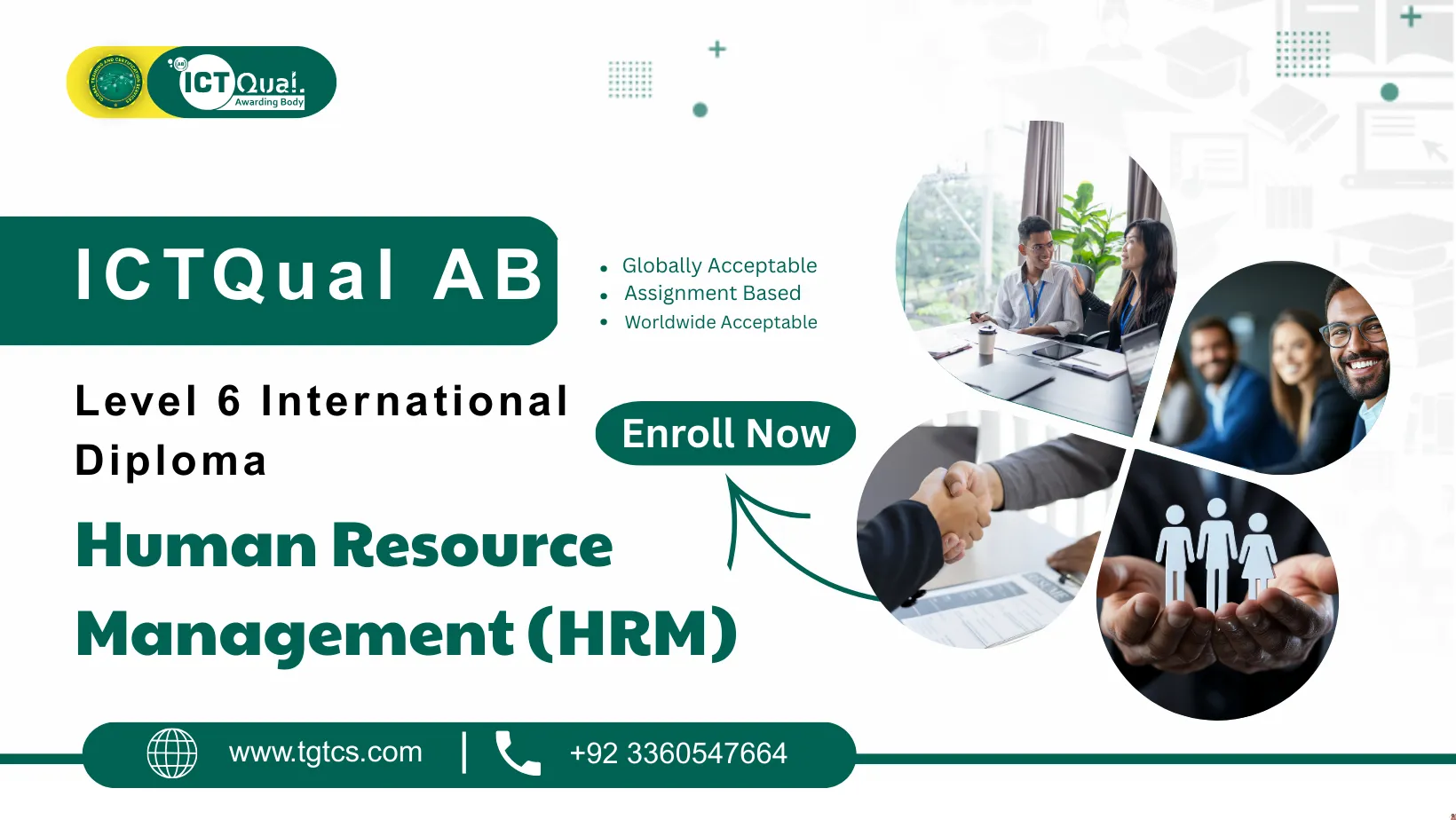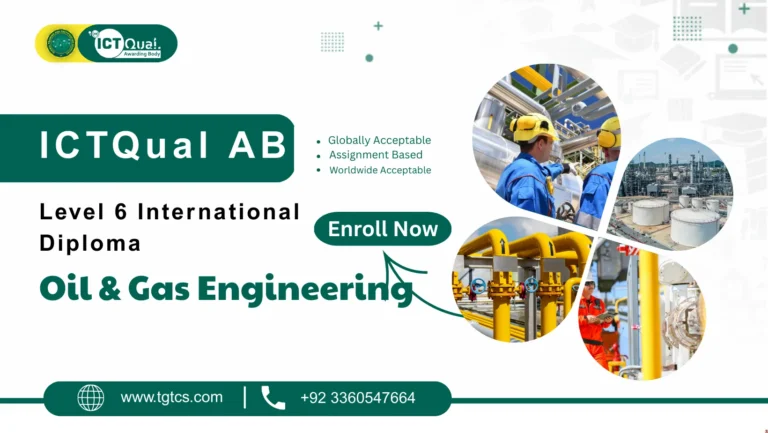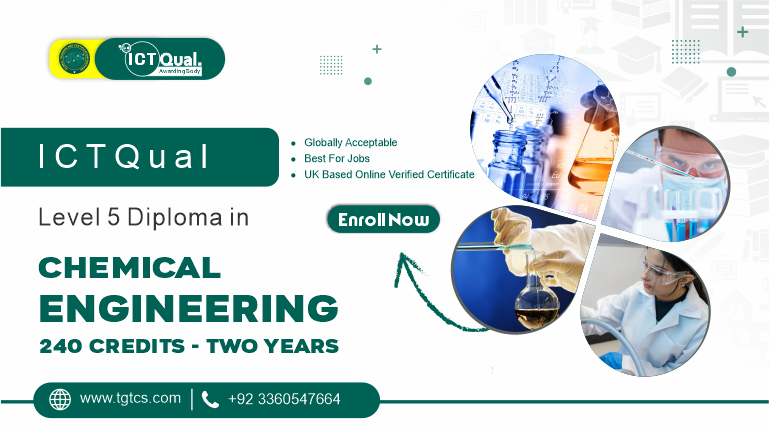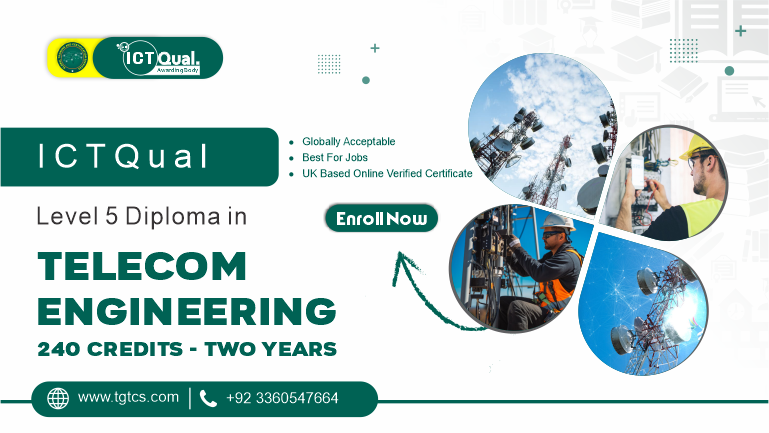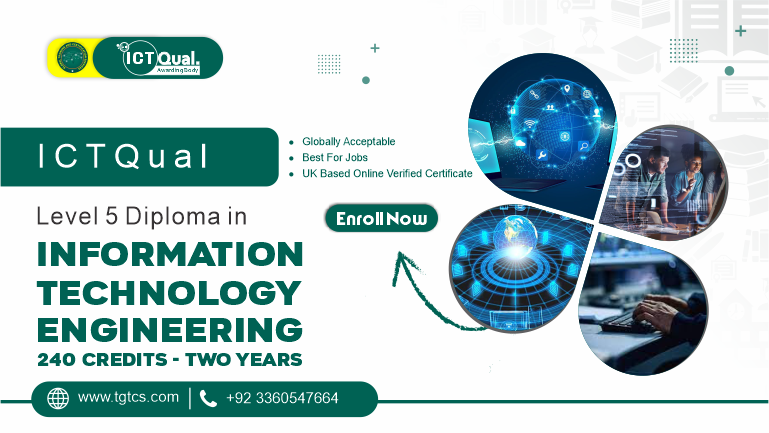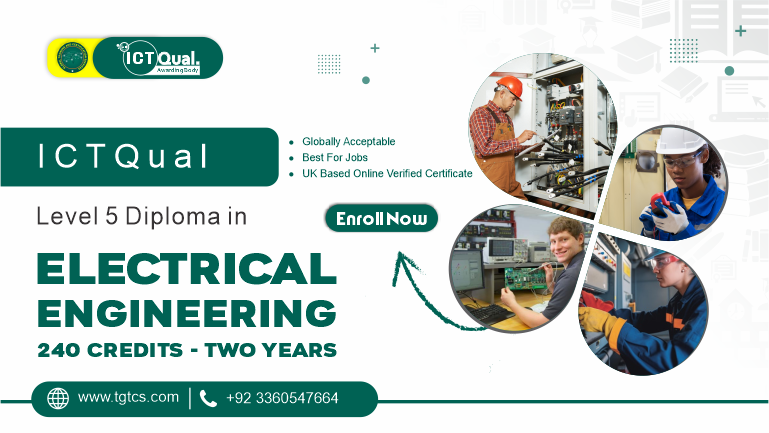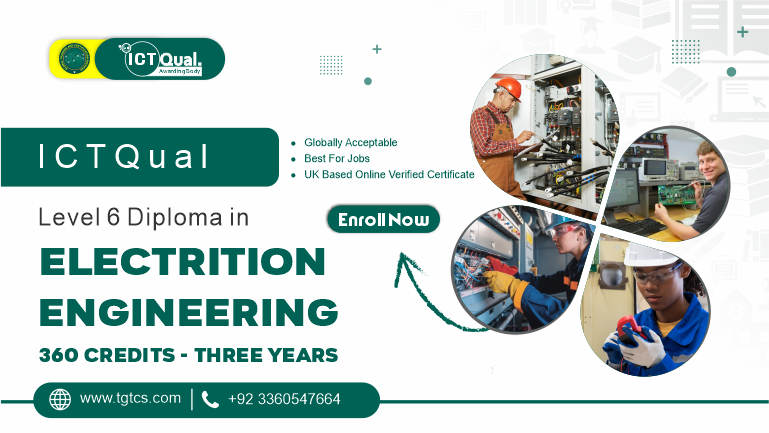ICTQual AB Level 6 International Diploma in Human Resource Management (HRM)
The ICTQual AB Level 6 International Diploma in Human Resource Management (HRM) is a prestigious and internationally recognized qualification designed to equip learners with advanced knowledge, professional expertise, and practical skills in managing people and organizations effectively. In today’s competitive business world, Human Resource Management plays a crucial role in driving organizational growth, employee engagement, and strategic decision-making, making this diploma an ideal choice for aspiring and experienced HR professionals.
This Level 6 International Diploma in Human Resource Management (HRM) provides a comprehensive understanding of modern HR practices, including talent acquisition, performance management, employee relations, organizational behavior, and strategic HR planning. Learners will also explore global HRM challenges, leadership in diverse workplaces, and the impact of labor law and international standards on workforce management.
The qualification is tailored for those who seek to enhance their careers in HRM, whether in local enterprises or multinational corporations. Through assignment-based assessments, learners gain practical insights and hands-on skills that can be applied directly to real-world HR challenges. The course’s flexible structure allows learners to progress at their own pace, making it highly suitable for both working professionals and fresh graduates.
By completing the ICTQual AB Level 6 International Diploma in Human Resource Management (HRM), learners will be fully prepared to take on leadership roles, strengthen their professional credibility, and unlock global career opportunities. This diploma not only enhances employability but also provides a strong foundation for further academic and professional growth in the field of Human Resource Management.
The Global Training and Certification Services is Approved Training Centre of ICTQual AB UK Ltd
Course Level and Credits
Level 6 International Diploma, 360 credits.
Suitable for HR professionals, managers, entrepreneurs, and students seeking advanced international Human Resource Management knowledge.
Mode of Study
Fully assignment-based; learn at your own pace.
Accessible worldwide with flexible options for working professionals.
Global Recognition & Attestation
British Council verifiable, MOFA and Embassy attested.
Recognized for job approvals, career advancement, and iqama approval in Gulf countries.
Scope and Purpose
Comprehensive coverage of modern HRM functions including recruitment, performance management, employee engagement, and organizational behavior.
Focus on both theoretical understanding and practical HR applications in global workplaces.
Skills and Knowledge Gained
Expertise in talent acquisition, training and development, employee relations, and labor law compliance.
Strategic HR planning, leadership, conflict resolution, and cross-cultural workforce management.
Career Benefits
Opens opportunities in HR departments of multinational corporations, consultancy firms, government, and NGOs.
Strengthens professional credibility, employability, and global recognition in the HR field.
Target Audience
Aspiring HR professionals, business managers, entrepreneurs, and graduates seeking an international HR career.
Experienced HR practitioners aiming to gain a globally recognized certification.
Unique Selling Points (USPs)
Flexible, self-paced study with 100% assignment-based assessment.
Prestigious, globally recognized Level 6 diploma in Human Resource Management.
Ideal for job opportunities, promotions, and iqama approval across international markets.
Mandatory Unit
This qualification, the ICTQual AB Level 6 International Diploma in Human Resource Management (HRM), consists of 36 mandatory units.
Year 1 – Foundation in Human Resource Management
- Introduction to Human Resource Management
- Principles of Organisational Behaviour
- Fundamentals of Business Management
- Employment Law and Workplace Regulations
- Communication Skills for HR Professionals
- Workforce Planning and Recruitment
- Employee Relations and Workplace Culture
- Diversity, Equity, and Inclusion in HRM
- Fundamentals of Training and Development
- Introduction to Performance Management
- Research Methods in Human Resource Management
- Professional Ethics and Corporate Responsibility
Year 2 – Intermediate Human Resource Management
- Strategic Human Resource Management
- Human Capital Development and Talent Management
- Organisational Learning and Knowledge Management
- Advanced Employee Relations and Negotiation
- Compensation and Benefits Management
- Labour Law and International HR Practices
- Human Resource Information Systems (HRIS)
- Leadership and Team Development
- Conflict Resolution and Workplace Mediation
- Project Management in Human Resources
- Research and Data Analysis for HRM
- Professional Development and Reflective Practice
Year 3 – Advanced Human Resource Management
- Global Human Resource Management
- Strategic Workforce Planning and Analytics
- Advanced Performance Management Systems
- Leadership in Organisational Transformation
- Corporate Governance and HRM Compliance
- International Labour Relations and Policies
- Risk Management and Employee Wellbeing
- HRM in Multinational and Cross-Cultural Contexts
- Innovation and Change Management in HRM
- Sustainable HRM and Corporate Social Responsibility
- Advanced Research in Human Resource Management
- Capstone Project in Human Resource Management
The ICTQual AB Level 6 International Diploma in Human Resource Management (HRM) equips learners with advanced knowledge, professional skills, and practical applications in HR, organizational leadership, and global workforce management.
Year 1 – Foundation in Human Resource Management
Introduction to Human Resource Management
- Understand the scope and significance of Human Resource Management in organizations.
- Explain the functions of HR including recruitment, training, and employee engagement.
- Analyze the role of HRM in organizational success and sustainability.
- Apply basic HR principles to workplace scenarios.
Principles of Organisational Behaviour
- Examine how human behavior impacts workplace performance.
- Understand motivation, leadership, and team dynamics in organizational contexts.
- Apply theories of organizational behavior to improve productivity.
- Evaluate workplace culture and employee satisfaction.
Fundamentals of Business Management
- Understand the core principles of business management and administration.
- Analyze the link between HR functions and overall business strategies.
- Apply management theories to organizational decision-making.
- Evaluate effective business planning and operations.
Employment Law and Workplace Regulations
- Understand key legal principles governing employment relationships.
- Analyze workplace rights, obligations, and dispute resolution mechanisms.
- Apply knowledge of contracts, termination, and employee protection.
- Evaluate compliance with national and international labor laws.
Communication Skills for HR Professionals
- Develop effective written, verbal, and non-verbal communication skills.
- Apply professional communication strategies in HR processes.
- Enhance negotiation and conflict-resolution skills.
- Evaluate the impact of communication on workplace relationships.
Workforce Planning and Recruitment
- Understand the importance of workforce planning in HRM.
- Apply effective recruitment and selection strategies.
- Analyze job roles, specifications, and competency-based frameworks.
- Evaluate recruitment methods for attracting diverse talent.
Employee Relations and Workplace Culture
- Understand the foundations of healthy employee relations.
- Analyze factors influencing workplace culture and employee morale.
- Apply employee engagement strategies to improve retention.
- Evaluate organizational practices that strengthen employer–employee trust.
Diversity, Equity, and Inclusion in HRM
- Understand the principles of diversity and equity in HRM.
- Analyze the role of HR in creating inclusive workplace environments.
- Apply strategies to promote fairness, accessibility, and equal opportunities.
- Evaluate the impact of diversity on innovation and performance.
Fundamentals of Training and Development
- Understand the purpose and methods of employee training.
- Design effective training programs aligned with organizational needs.
- Apply principles of adult learning to HR development initiatives.
- Evaluate the outcomes of training and development programs.
Introduction to Performance Management
- Understand the concepts and processes of performance management.
- Apply appraisal and feedback systems to measure employee performance.
- Analyze performance improvement strategies.
- Evaluate performance frameworks for aligning individual and organizational goals.
Research Methods in Human Resource Management
- Understand research methodologies applied in HRM.
- Collect and analyze data relevant to HR and organizational behavior.
- Apply research tools to workplace case studies.
- Present findings with clarity and professional accuracy.
Professional Ethics and Corporate Responsibility
- Understand the role of ethics in Human Resource Management.
- Apply ethical decision-making frameworks to HR practices.
- Analyze the importance of corporate social responsibility in HR.
- Evaluate ethical dilemmas in recruitment, performance, and employee relations.
Year 2 – Intermediate Human Resource Management
Strategic Human Resource Management
- Understand the role of HR in achieving long-term organizational strategy.
- Analyze models of strategic HR planning and alignment.
- Apply HR strategies to support competitive advantage.
- Evaluate the effectiveness of HR’s contribution to corporate success.
Human Capital Development and Talent Management
- Understand methods of developing employee potential and leadership skills.
- Apply talent acquisition and retention strategies.
- Analyze succession planning frameworks in HRM.
- Evaluate the impact of talent management on organizational growth.
Organisational Learning and Knowledge Management
- Understand the principles of knowledge sharing in organizations.
- Apply learning organization models to HR strategies.
- Analyze the role of HR in fostering continuous learning.
- Evaluate systems that enhance knowledge management and innovation.
Advanced Employee Relations and Negotiation
- Understand advanced strategies in managing employee relations.
- Apply negotiation skills to resolve workplace disputes.
- Analyze collective bargaining practices and labor relations.
- Evaluate the effectiveness of mediation and negotiation frameworks.
Compensation and Benefits Management
- Understand the principles of reward systems and employee benefits.
- Apply compensation strategies that attract and retain employees.
- Analyze the role of financial and non-financial incentives.
- Evaluate performance-linked pay and benefits structures.
Labour Law and International HR Practices
- Understand comparative labor laws across international contexts.
- Apply labor regulations to multinational workforce management.
- Analyze the implications of global HR policies and compliance.
- Evaluate international HR challenges and best practices.
Human Resource Information Systems (HRIS)
- Understand the role of HR technology in modern HRM.
- Apply HRIS to recruitment, payroll, and performance monitoring.
- Analyze data-driven decision-making through HR systems.
- Evaluate the efficiency of HRIS in supporting HR operations.
Leadership and Team Development
- Understand the principles of leadership in HRM.
- Apply team development strategies to enhance workplace performance.
- Analyze leadership styles and their impact on organizational culture.
- Evaluate methods for building high-performing teams.
Conflict Resolution and Workplace Mediation
- Understand common causes of workplace conflict.
- Apply structured mediation processes to resolve disputes.
- Analyze the role of HR in maintaining harmonious workplaces.
- Evaluate conflict resolution strategies for long-term effectiveness.
Project Management in Human Resources
- Understand the role of project management in HR initiatives.
- Apply project planning tools and methodologies to HR projects.
- Analyze project risks and mitigation strategies in HR contexts.
- Evaluate the success of HR projects through measurable outcomes.
Research and Data Analysis for HRM
- Understand qualitative and quantitative research methods for HRM.
- Apply data analysis techniques to HR and workforce studies.
- Analyze HR trends using empirical evidence.
- Evaluate research findings to support strategic HR decisions.
Professional Development and Reflective Practice
- Understand the importance of lifelong learning in HRM.
- Apply reflective practice to enhance professional growth.
- Analyze personal strengths and areas for improvement in HR roles.
- Evaluate continuing professional development strategies.
Year 3 – Advanced Human Resource Management
Global Human Resource Management
- Understand HR practices in global and multinational organizations.
- Apply cross-border HR strategies to manage diverse workforces.
- Analyze international HR challenges, including expatriate management.
- Evaluate best practices for global workforce integration.
Strategic Workforce Planning and Analytics
- Understand workforce analytics and predictive HR tools.
- Apply workforce planning strategies aligned with organizational goals.
- Analyze HR data to optimize staffing and productivity.
- Evaluate the impact of workforce analytics on HR decision-making.
Advanced Performance Management Systems
- Understand models of performance appraisal and monitoring.
- Apply performance metrics to evaluate individual and team outcomes.
- Analyze continuous feedback and 360-degree evaluation methods.
- Evaluate performance management systems in complex organizations.
Leadership in Organisational Transformation
- Understand the role of HR leadership in driving change.
- Apply leadership theories to organizational transformation.
- Analyze HR strategies during mergers, acquisitions, and restructuring.
- Evaluate the effectiveness of leadership in organizational transitions.
Corporate Governance and HRM Compliance
- Understand HR’s role in supporting corporate governance frameworks.
- Apply HR compliance practices to ethical and legal standards.
- Analyze policies that promote accountability and transparency.
- Evaluate HR’s contribution to strong governance practices.
International Labour Relations and Policies
- Understand global labor relations frameworks and conventions.
- Apply HR practices to meet international labor standards.
- Analyze policies of international organizations like ILO.
- Evaluate the impact of global labor policies on HR strategies.
Risk Management and Employee Wellbeing
- Understand risk management principles within HRM.
- Apply wellbeing programs to enhance employee satisfaction.
- Analyze occupational health and safety policies in HR.
- Evaluate strategies to mitigate workplace risks.
HRM in Multinational and Cross-Cultural Contexts
- Understand cultural diversity in multinational organizations.
- Apply HR strategies to manage cross-cultural teams effectively.
- Analyze communication barriers in multicultural workplaces.
- Evaluate HR best practices for global workforce inclusivity.
Innovation and Change Management in HRM
- Understand the role of innovation in modern HR functions.
- Apply change management frameworks to HR projects.
- Analyze the challenges of digital transformation in HRM.
- Evaluate innovative practices for future-ready HR strategies.
Sustainable HRM and Corporate Social Responsibility
- Understand the concept of sustainability in HR practices.
- Apply CSR initiatives to enhance employee and community engagement.
- Analyze HR’s role in promoting green and ethical practices.
- Evaluate sustainable HRM models for long-term success.
Advanced Research in Human Resource Management
- Understand methodologies for advanced HR research.
- Apply data collection and analysis techniques in HR studies.
- Analyze trends and emerging issues in global HRM.
- Evaluate the implications of research findings on HR policy.
Capstone Project in Human Resource Management
- Understand how to integrate HR knowledge into a practical project.
- Apply research, analysis, and critical thinking to HR challenges.
- Analyze complex HR issues using evidence-based approaches.
- Evaluate strategic HR solutions through a final project presentation.
The ICTQual AB Level 6 International Diploma in Human Resource Management (HRM) provides learners with advanced HR knowledge, leadership skills, and globally recognized qualifications.
Global Recognition and Career Advancement
- Qualification is British Council verifiable, MOFA and Embassy attested.
- Opens opportunities for HR leadership roles across multinational organizations.
- Highly valued for career growth and iqama approval in Gulf countries.
Flexible and Accessible Learning
- Fully assignment-based learning, completed at your own pace.
- Accessible worldwide, ideal for working professionals and students.
- No classroom restrictions, allowing flexibility for busy schedules.
Comprehensive HR Knowledge and Skills
- Covers HR strategy, workforce planning, employee relations, and compliance.
- Builds expertise in leadership, organizational development, and change management.
- Equips learners with tools to handle complex HR challenges in global contexts.
Practical Application in HRM
- Focuses on real-world HR practices and case studies.
- Enhances decision-making through workforce analytics and HR technology.
- Provides practical skills in conflict resolution, performance management, and talent development.
Increased Employability and Professional Credibility
- Boosts professional profile for senior HR, talent management, and organizational development roles.
- Recognized by employers worldwide for credibility and advanced HR competencies.
- Supports career transitions into strategic HR and leadership positions.
In conclusion, the ICTQual AB Level 6 International Diploma in Human Resource Management (HRM) is a globally recognized, flexible, and career-focused qualification. It empowers learners with advanced HR knowledge, leadership skills, and international credibility to excel in today’s competitive business world.
The ICTQual AB Level 6 International Diploma in Human Resource Management (HRM) is designed for individuals who aspire to advance their careers in HR and develop the skills needed to succeed in global workforce management.
Aspiring HR Professionals
- Perfect for individuals who want to begin a career in human resource management.
- Provides essential knowledge and practical skills to enter the HR field confidently.
Experienced HR Practitioners
- Ideal for professionals seeking to upgrade their HR knowledge to a strategic level.
- Helps in transitioning from operational HR roles to leadership and management positions.
Business Leaders and Managers
- Suitable for managers aiming to strengthen their people management expertise.
- Equips leaders with advanced HR strategies to support organizational growth.
Career Changers and Job Seekers
- Excellent for individuals planning to shift careers into HR and talent management.
- Builds credibility with a recognized international diploma for global employability.
International Candidates and Professionals Abroad
- Tailored for learners seeking globally recognized, British Council verifiable certification.
- Supports iqama approval and enhances career opportunities in Gulf and international markets.
In conclusion, the ICTQual AB Level 6 International Diploma in Human Resource Management (HRM) caters to aspiring HR professionals, experienced practitioners, managers, and international learners, making it a versatile qualification for diverse career paths in the HR field.
Course Overview
Course Level
Level 6
Course Units
36 Units
Credits
360
Duration
3 years
